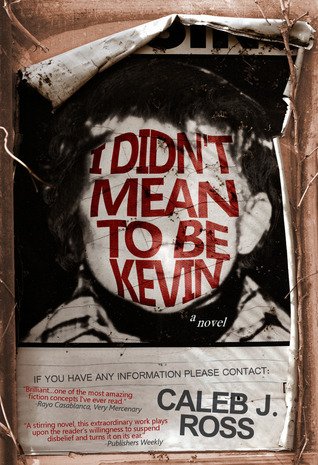Caleb J. Ross's Blog, page 66
March 17, 2012
Reading Riddley Walker and Fighting a Cold. Likely Not a Coincidence.

I'm fighting a cold. And losing. Viruses seem to attack at times that I otherwise have both time and motivation to write (fiction, that is, not a quick blog post). One day, I'll write an entire collection of vignettes under the influence of TheraFlu. Until then, I'll stick to complaining that my body apparently doesn't want me to write fiction.
Today's bout comes at an especially bad time as I have two projects underway that I am damn excited about. One, I've hinted at a few times before (coded 4C until myself and the other writers involved come up with something better), which is about 80% complete. I can smell the maggots on the bloody horizon. The other, a project I haven't much started but for sketching a few ideas and doing some homework reading, is already gnawing at me. The homework: read Riddley Walker by Russell Hoban. The assignment: a dare to write something, anything really, immediately afterwards. The teacher: Sarah D'Stair, writer and wife of writer Pablo D'Stair. Together, they are a formidable peer pair of peer pressure.
A couple weeks ago in Chicago Sarah, Pablo, and myself (along with an entire host of friends and writers) sat down to a few drinks at Miller's Pub. Conversation drifted to writing, then needled down to my own writing (Sarah's insistence, not mine, I assure you), then further pricked at my style of writing, one which was described in variations of meticulous, precise, and, perhaps, over-wrought. So, a dare to write something more lose, more free-flowing, something to explore language rather than wring some beautiful (what I think is beautiful) language drug from it. I accepted. And now that I've had a few days to think about my drunken acceptance, I've leveled, but in a way that's made me even more excited about the project than I was when first dared.
I don't know that I'll ever be able to loosen up the way Hoban did with Riddley Walker—the book reads like a mix between Middle English poetry and the ramblings of a dented waterhead—but the core concept, that of letting language, for lack of a better term, flow, is intriguing. I look forward to it. Once I get over this damn cold.
March 15, 2012
Get a free print copy of I Didn't Mean to be Kevin. Goodreads giveaway ends March 31st.
New story, "The Lipidopterist," read live at The Meshuggah Cafe, recorded by Booked Podcast

The fellows over at Booked Podcast are gents in the truest sense of the word. By that I mean they are whimsical placcards on the bathroom doors of bar restrooms. Also, they happen to be amazingly active participants in the podcast and reading communities, so much so that they are dedicating many future episodes of their podcast to live readings as recorded during the 2012 AWP Conference in Chicago, IL.
Though my reading, done at The Meshuggah Cafe in St. Louis on February 28th, wasn't officially part of the AWP Conference (which started February 29th in Chicago), the entire week blends for me into a single mess of drink, friends, and drunk friends.
This recording captures the first time I had read "The Lipidopterist" out loud in front of an audience. All-in-all, I think it worked.
Have a listen, then check out Booked Podcast for more. Be sure to subscribe to the podcast so you will never miss an episode.
Lastly, head over to Amazon to buy "The Lipidopterist," why doncha? It's even available for FREE if you have that Amazon Prime thing.

March 9, 2012
New short story available at Amazon.com, "The Lipidopterist." Man collects human lips. Ex-wife wants half of his collection.
It has been a while since I've had a short story to whore out to the world. While I've been busy bombarding poor souls with news of my 3 recent book releases, I haven't had much to say in the way of short stories since…well, since September, if you can count my non-fiction piece "Denis Johnson Almost Drank My Pee" as a short story at Dark Sky (though "short story" implies fiction, and the Dark Sky piece isn't). Anyway, my story "The Lipidopterist" is now available as a Kindle story over at Amazon.com. I recently read this story in St. Louis at the Meshuggah Cafe. The reactions were quite good, I must say.
I believe it is also part of the Kindle lending library thing, or at least will be shortly. Still, though, it's only $0.99. Fork over the coins!
Available now from the fake publisher Viscera Irrational. Buy. Read.
February 26, 2012
Quotes from Flannery O'Connor's "Some Aspects of the Grotesque in Southern Fiction"
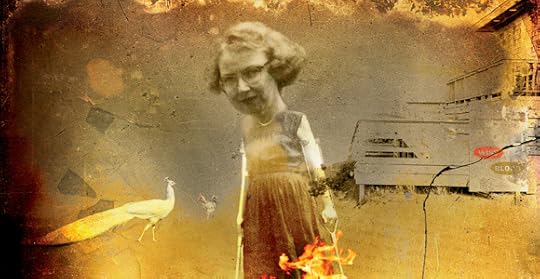
In the world of grotesque fiction, Flannery O'Connor is the go-to mouth to voice what's worth our academic time and what's worth ignoring. Knowing my love of the grotesque and my respect for Flannery O'Connor, Richard Thomas passed along a copy of O'Connor's important "Some Aspects of the Grotesque in Southern Fiction" (1960) which somehow I had never read before. I'm glad I have now rectified that problem. Below are a few choice quotes, words I'm sure I will cite for the rest of my writing career, especially when citing my own grotesque fiction.
On mystery as motivation
…if the writer believes that our life is and will remain essentially mysterious, if he looks upon us as beings existing in a created order to whose laws we freely respond, then what he sees on the surface will be of interest to him only as he can go through it into an experience of mystery itself. His kind of fiction will always be pushing its own limits outward toward the limits of mystery, because for this kind of writer, the meaning of a story does not begin except at a depth where adequate motivation and adequate psychology and the various determinations have been exhausted. Such a writer will be interested in what we don't understand rather than in what we do.
On exhausting human knowledge
Fiction begins where human knowledge begins–with the senses–and every fiction writer is bound by this fundamental aspect of his medium.
On the path of least resistance
Henry James said that Conrad in his fiction did things in the way that took the most doing. I think the writer of grotesque fiction does them in the way that takes the least, because in his work distances are so great. He's looking for one image that will connect or combine or embody two points; one is a point in the concrete, and the other is a point not visible to the naked eye, but believed in by him firmly, just as real to him, really, as the one that everybody sees.
On sentimentality
Even though the writer who produces grotesque fiction may not consider his characters any more freakish than ordinary fallen man usually is, his audience is going to; and it is going to ask him–or more often, tell him–why he has chosen to bring such maimed souls alive. Thomas Mann has said that the grotesque is the true anti-bourgeois style, but I believe that in this country, the general reader has managed to connect the grotesque with the sentimental, for whenever he speaks of it favorably, he seems to associate it with the writer's compassion.
On being Christ-haunted
Whenever I'm asked why Southern writers particularly have a penchant for writing about freaks, I say it is because we are still able to recognize one. To be able to recognize a freak, you have to have some conception of the whole man, and in the South the general conception of man is still, in the main, theological. That is a large statement, and it is dangerous to make it, for almost anything you say about Southern belief can be denied in the next breath with equal propriety. But approaching the subject from the standpoint of the writer, I think it is safe to say that while the South is hardly Christ-centered, it is most certainly Christ-haunted. The Southerner, who isn't convinced of it, is very much afraid that he may have been formed in the image and likeness of God. Ghosts can be very fierce and instructive. They cast strange shadows, particularly in our literature. In any case, it is when the freak can be sensed as a figure for our essential displacement that he attains some depth in literature.
On audience limitations
The novelist must be characterized not by his function but by his vision, and we must remember that [the author's] vision has to be transmitted and that the limitations and blind spots of his audience will very definitely affect the way he is able to show what he sees. This is another thing which in these times increases the tendency toward the grotesque in fiction.
On novelists and and poetry
The great novels we get in the future are not going to be those that the public thinks it wants, or those that critics demand. They are going to be the kind of novels that interest the novelist. And the novels that interest the novelist are those that have not already been written. They are those that put the greatest demands on him, that require him to operate at the maximum of his intelligence and his talents, and to be true to the particularities of his own vocation. The direction of many of us will be more toward poetry than toward the traditional novel.
photo credit: http://marcyankus.com/site/
February 25, 2012
What is the value of a Goodreads.com book Giveaway? 93% of entrants had never heard of me. 88% plan on reading my books.
 I've long read of the marketing effectiveness of giving away books using the Giveaways option at Goodreads.com. And though I've conducted one giveaway in the past (for Stranger Will) I've not yet been able to confidently attribute any gains in readership or sales due to that giveaway. With this attribution gap in mind, I set out to conduct a giveaway for As a Machine and Parts, that would allow me to more precisely measure the value of a Goodreads.com user. My conclusion: a Goodreads.com user stands a great chance of becoming a reader.
I've long read of the marketing effectiveness of giving away books using the Giveaways option at Goodreads.com. And though I've conducted one giveaway in the past (for Stranger Will) I've not yet been able to confidently attribute any gains in readership or sales due to that giveaway. With this attribution gap in mind, I set out to conduct a giveaway for As a Machine and Parts, that would allow me to more precisely measure the value of a Goodreads.com user. My conclusion: a Goodreads.com user stands a great chance of becoming a reader.
The setup
I listed a 2 copy giveaway for As a Machine and Parts to take place between 2/3/2012 and 2/15/2012. During this time the giveaway received a total of 398 entries. After the giveaway was closed for entries, I followed up with all but 46 entrants (because I either knew them personally, which could skew the results, or the user was not accepting personal messages) with a survey of 8 simple yes/no questions that touch on topics such as prior recognition, intent to read/buy my books, intent to connect on social networks, and the desire to connect with me, as an author, in real life. The actual questions asked in the survey include:
Had you heard of author Caleb J. Ross before this Goodreads.com giveaway?
Had you heard of the book As a Machine and Parts before this Goodreads.com giveaway?
Do you intend to purchase As a Machine and Parts in the future?
Do you intend to read As a Machine and Parts in the future?
Do you intend to read any other books by author Caleb J. Ross?
Do you plan to connect with author Caleb J. Ross on social networks such as Twitter, Facebook, and Google+?
If Caleb J. Ross were to visit your city/town for a reading, would you consider attending?
Would you like to subscribe to the Caleb J. Ross newsletter?
The results of my Goodreads.com giveaway

93% of non-winning entrants had never heard of me before this contest. Translation: I'm speaking to an audience who might not otherwise have heard me.
94% of non-winning entrants had never heard of As a Machine and Parts before the contest.
36% of non-winning entrants said they planned on purchasing the book, even though they didn't win. This is a strange percentage when compared to the 90% of people who intend to read the book. I suppose most readers will look to their library for this book?
88% of non-winning entrants intend to read other books by me. This is an incredibly huge number, especially when compared to the 94% of entrants who had never even heard of me.
37% of non-winning respondents plan to connect with me on social networks
92% of non-winning respondents would come to a reading event if I were to visit their town.
51% of non-winning respondents signed up for my Email is Dead email newsletter. Though I'm convinced that an email newsletter can offer what RSS feeds and social statuses don't offer more effectively, I do believe that newsletters play a role in summarizing valuable content (which was affirmed with an earlier Facebook poll conducted on this very topic).
38% of non-winning respondents added As a Machine and Parts to one of their Goodreads.com bookshelves
25% of non-winning respondents downloaded Charactered Pieces
25% of non-winning respondents downloaded Murmurs: Gathered Stories Vol. One downloaded
Additional Goodreads.com giveaway results not included in the chart above
51% of non-winning respondents signed up for my Email is Dead email newsletter. Though I'm convinced that an email newsletter can offer what RSS feeds and social statuses don't offer more effectively, I do believe that newsletters play a role in summarizing valuable content (which was affirmed with an earlier Facebook poll conducted on this very topic).
38% of non-winning respondents added As a Machine and Parts to one of their Goodreads.com bookshelves
How many people actually downloaded the free ebooks?
These percentages are interesting because it means that 75% of people who filled out the survey did not download either of the free ebooks. Either people love filling out surveys or they've simply forgotten to download the books.
4% of non-winning respondents added Charactered Pieces (one of the free ebooks given away to survey respondents) to one of their Goodreads.com bookshelves
1% of non-winning respondents added Murmurs: Gathered Stories Vol. One (one of the free ebooks given away to survey respondents) to one of their Goodreads.com bookshelves
These percentages, when compared to the download percentages above, are interesting as they may elude to a few possibilities: 1) Goodreads.com users may be averse to adding ebooks to reading lists, 2) Goodreads.com users may not always add a book to their lists as soon as they receive the book; perhaps they wait until they actually begin reading it, 3) something else entirely. This seems too big of a discrepancy to ignore, so if anyone has any thoughts, please let me know.
Why do I think my survey was effective? OR Here Come the Caveats.
The response-rate for the survey was an amazing 29%. The industry open-rate for Art/Artist newsletters is 17.54% [1]. This isn't exactly a parallel comparison, as open-rate is not the same as response-rate, but it's a close enough comparison to provide some valuable insight. The response rate is also likely inflated because of the following factors:
The entrants were already "in the sales funnel" in that they had already reached out with an interest in my book. In other words, I'm not blindly sending the survey to readers. I'm instead sending the survey to interested readers.
I allowed only yes/no answers, leaving out "uncertain" responses. In hindsight, I probably should have provided an "uncertain" response (and perhaps a comments section for each answer).
It's possible that users may have only considered certain actions because the survey included them (connecting on social networks, for example). Would the respondents have connected with me on social networks had they not been introduced to the idea by way of the survey itself? Possibly not.
I promised free ebook downloads to all respondents. Obviously, free books must have a lot to do with the high response rate.
My communication was very sales averse. I approached giveaway entrants with respect. Truthfully, I am a naturally respectful guy, so I just spoke the way I would normally speak.
The survey was incredibly simple. 12 questions with 9 of them being yes/no questions.
What are your thoughts? Have you conducted a similar survey? What did your results indicate?
[1] According to Mailchimp ↩
February 16, 2012
Family Guy does Stephen King, X3
(part of my ongoing Unexpected Literary References series)
Yet another Family Guy take on something Stephen King, this time with parodies of three movie adaptations of King works: Stand by Me (based on the novella The Body), Misery (based on the novel of the same name), and The Shawshank Redemption (based on the novella Rita Hayworth and Shawshank Redemption).

Peter: Hi, it's me, Peter. Your TV cartoon pal. You know, Lois has been bitching lately that I watch too much TV and don't read enough books. So I went to the library and picked up three books by the greatest author in the last thousand years: Stephen King, and tonight, I'd like to share them with you.
Click over the the episode's IMDB page to see a clip.
February 15, 2012
That great writer, Harry Potter, so says Stan

Here's a quick one for the Unexpected Literary References list.
From American Dad, Season 2 : Ep. 14: An Apocalypse to Remember
Hayley: There's no such thing as mutants because the world didn't end.
Steve: You lied to us, Dad?
Stan: Oh, I tell a great story and I'm a liar, but Harry Potter does it, and he's your favorite writer.
February 11, 2012
Book Metadata. Let the Algorithm Sell Your Books For You. A Primer.

There's a rule when it comes to search engine optimization: Content is King. Basically, this means that above everything else—all the link building, code tweaking, and social networking—the most important factor of any well-optimized web presence is the content itself. What good is your website without compelling content? And without compelling content, how can you expect other websites to link back to yours? I would go so far as to suggest the rule should be Content is God, but then we lose out on the lovely alliteration.
But the Content is King rule governs everything, not just your website or social profiles. Your books themselves actually contain Kingable Content that can be tweaked and optimized for marketing benefits. I'm not suggesting that you to manipulate your book's words for the sake of search engines; that would be [keyword]ing+stupid. Rather, I'm here to clue you in to an area of underutilized content that supports your book even after publication. Metadata.
What is Metadata?
Metadata, whether it's book metadata or webpage metadata, is basically the same thing: behind-the-scenes data (subject, genre, theme, etc.) that describes the front-and-center content (the book itself). The categories assigned to help shelve books within the Dewey Decimal system, that's a form of metadata. Those Product Details on every Amazon.com book page. That's metadata. When you do a search on a computer for an author or topic, the search results are partially powered by metadata. Those Amazon.com If You Liked ____, You May Also Like ____ recommendations…metadata factors in to those.

Why Care About Metadata?
The more information available to search engines and book sites about your book, the more information those search engines and book sties have to use in providing relevant results and recommendations to readers. And while descriptions such as publisher, shipping weight, and product dimensions (pictured above) may be useful for some purposes, they don't speak to the general concerns of most readers, such as theme, genre, subject, etc. That's where enhanced metadata comes in.
Not many people realize just how deep the metadata rabbit hole goes. Which is why, for lack of a better term, I'm using "enhanced metadata" to refer to all those unseen rabbit hole nooks and crannies. Enchanced metadata allows you, the author or the reader, to supply book sites with in-depth information about a book. Such information may include, but is not limited to:
fiction or nonfiction categorization
genre
subjects
pace
tone
writing style
perspective of the narration
tense (past, present, future)
are there strong male or strong female characters
errata
movie connections
books that influenced this book
books influenced by this book
books that cite this book
books cited by this book
characters
first sentence
how many characters does the book follow
literary devices used
Where Can Metadata be Manipulated?
Shelfari (refers to enhanced metadata as Book Extras)
Shelfari is a social networking and book cataloging site which powers much of the enhanced metadata provided to Amazon.com. Existing Book Extras data can be seen either by accessing a particular book's page at Shelfari.com or by accessing the book's page via your Author Central account at Amazon.com.
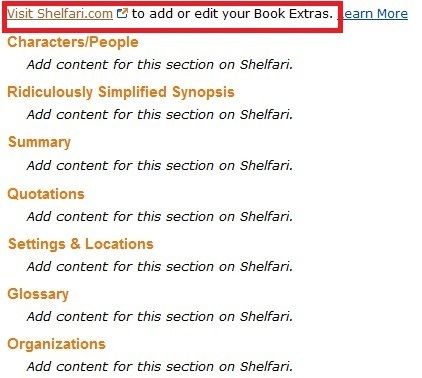
More about Shelfari Book Extras
Goodreads (refers to enhanced metadata as Book Metadata)
Goodreads, like Shelfari, is a social networking and book cataloging site. Goodreads feels to me like a much more engaging platform than Shelfari, with far more opportunities for networking with readers.
To access the Book Metadata at Goodreads, first click on the "edit review" link of any book you've read. On the next page, toward the bottom, you'll click on the "edit book metadata" link. If you have not read a book, Goodreads requires that you become a "librarian" to edit the Book Metadata.


Goodreads also allows some users to become Librarians, meaning they are able to edit not only book metadata, but also all information about a book including authors, descriptions, publishers, page numbers, and on and on. I highly recommend applying for librarian status. Not only am I an organization nerd, I love being able to more fully control the data with the books I've written.
LibraryThing (refers to enhanced metadata as Common Knowledge)
LibraryThing is yet another book networking site, and in my opinion is the least user-friendly. But readers use it, so as an author it's important for me to be there.
To access the Common Knowledge section, simply open up an existing book page and scroll down to about the middle of the page.
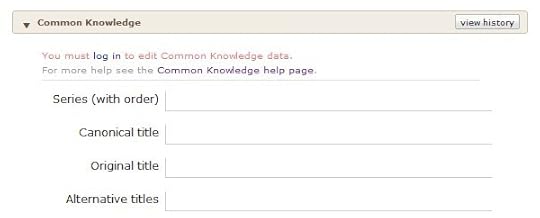
More information about the LibraryThing Common Knowledge metadata can be found here.
Additional information on metadata (as well as general SEO information for authors) can be found in this amazing PBS.org article, "A Self-Publisher's Guide to Metadata for Books."
top photo credit: http://www.flickr.com/photos/leprecon/
February 8, 2012
How can a happenstance bucket list lead to compelling characters?
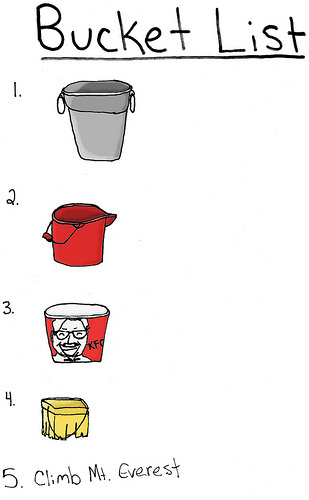
Bucket lists are generally grandiose compilations of big events with universal appear. So, you want to swim with the dolphins and go cave spelunking in Chile? Well, who the hell doesn't want to do those things? Big events do not a compelling character make.
I believe I've taken the bucket list concept to a much more satisfying place, one that celebrates happenstance and relative minutiae rather than expensive plane tickets and vacation photo fodder.
For a long time, I've been paying attention to the unique moments of my life, ones that more often than not seem to materialize without any provocation, but that are nonetheless sources of pride. Here are a few examples of the accomplishments on my bucket list:
Free alcohol drinks on an airplane (described here)
Witness a light bulb burning out
Make a day-stranger friend in an unfamiliar city (adapted to the non-fiction piece "A Chinese Gemini" from my chapbook, Charactered Pieces: stories)
Witness a highway car wreck
Live through a tornado
Tell a depressed-looking stranger she's beautiful, without any ulterior motive
Call 911
What is the impact of these items in terms of character development?
The way a character reacts to each of the events above says a great deal about the mental state and lifestyle of the character. Does a character routinely get free drinks on an airplane? If so, how? If not, how would this character react to such a unique gesture? Would a character witnessing a light bulb burn out assume he caused the light to burn out? Was there a big event happening when the light went out, such as a wedding, award ceremony, or something smaller like a criminal interrogation? Who is the day-stranger friend? How did this friend meet your story's character? Perhaps the meeting was planned without one of the parties knowing. Who was in the car wreck? How was it that our character was in the right place at the right time to witness this car wreck? Why did the character call 911? Was it a prank call? And on and on and on…
By contrast, a character connected to a big event from a traditional bucket list item (such as skydiving or swimming with dolphins) may simply be the product of a plot rather than a rounded character in his own right.
Traits implied by a happenstance bucket list puts the focus on the character rather than on the plot. What are some items on your happenstance bucket list?
Photo credit: http://www.flickr.com/photos/ratatatr...

